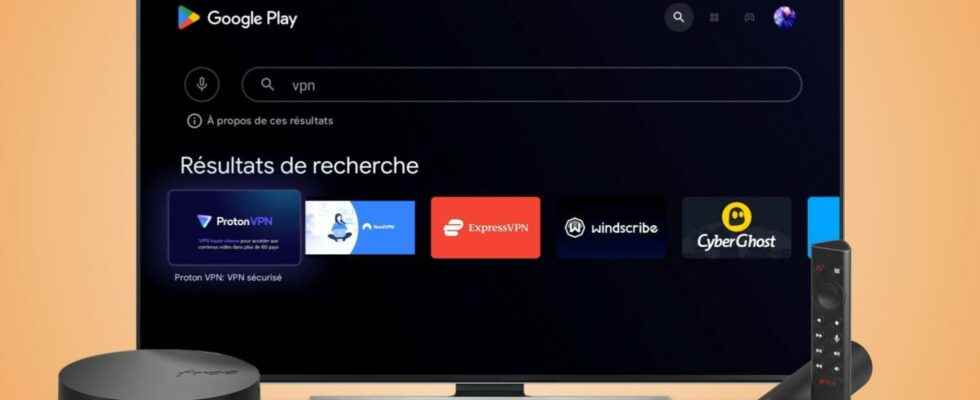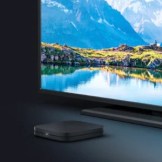VPNs today offer many very useful services on a wide range of connected devices. If we already know their benefits for computers and smartphones, their use is also very useful on Google TV.
Basically used to protect data exchanges between devices connected to the web as well as its anonymity, VPNs now offer many other features that go far beyond these frameworks. Among them: the circumvention of geographical restrictions or geoblocking.
This feature basically allows access, legally, to content blocked in a locality due to the different legislations in force. What could be more logical then to install a VPN directly on your TV to enjoy the catalogs of streaming and VOD platforms around the world on the big screen, in the best possible conditions.
Why use a VPN on connected TV?
Installing a VPN on your connected TV has many advantages. First of all to benefit from a secure and anonymous connection when you browse from your TV. Then, depending on the VPN chosen, the no-logs policy ensures that your personal data cannot be shared, and therefore you avoid potential targeted advertising from this or that application.
But the biggest advantage is undoubtedly the possibility of circumventing the geoblocking policies introduced by certain countries. By relocating your IP address to a server located in the United States or Japan, for example, you can access all the audio and video content hosted there without restrictions. Enough to access many films or series that are not available in France because of the chronology of the media, but above all licensing concerns.
We can also think of IPTV services, a VPN, allowing access to all their offers in a more secure way, the latter having a reputation for being insecure. Some services, even in France, are not accessible without a VPN. In any case, we advise you to favor legal third-party IPTV services like Molotov. However, it is quite possible to configure IPTV access via Kodi on Google TV coupled with a VPN, especially for foreign channels.
What are the best VPNs under Google TV?
Most of the VPNs in our comparator have a Google TV version accessible directly from the Play Store. We have selected the three best services based on several criteria: interface, performance and compatibility with geoblocked content.
ExpressVPN: Most Efficient
With more than 10 years of seniority and experience, ExpressVPN has always relied on its performance to highlight its offer. With more than 3,000 servers and 160 locations in 94 countries, the service casts a wide net, although these numbers are lower than its main competitors. Never mind, it’s efficiency that takes precedence. It is on the performance side that ExpressVPN emphasizes, highlighting its in-house protocol called Lightway and competing with the Open-Source Wireguard Protocol that many services already use.
In general, ExpressVPN’s servers show very good speeds, often superior to what is found with many other services. We note all the same that the VPN has chosen not to offer specialized servers (Streaming, P2P, Tor, etc.). ExpressVPN has claimed, since its inception, complete confidentiality regarding the sensitive information of its users. The service therefore applies a strict zero-log policy which has proven its effectiveness many times over, even if there are still doubts, as we detail in our full review.
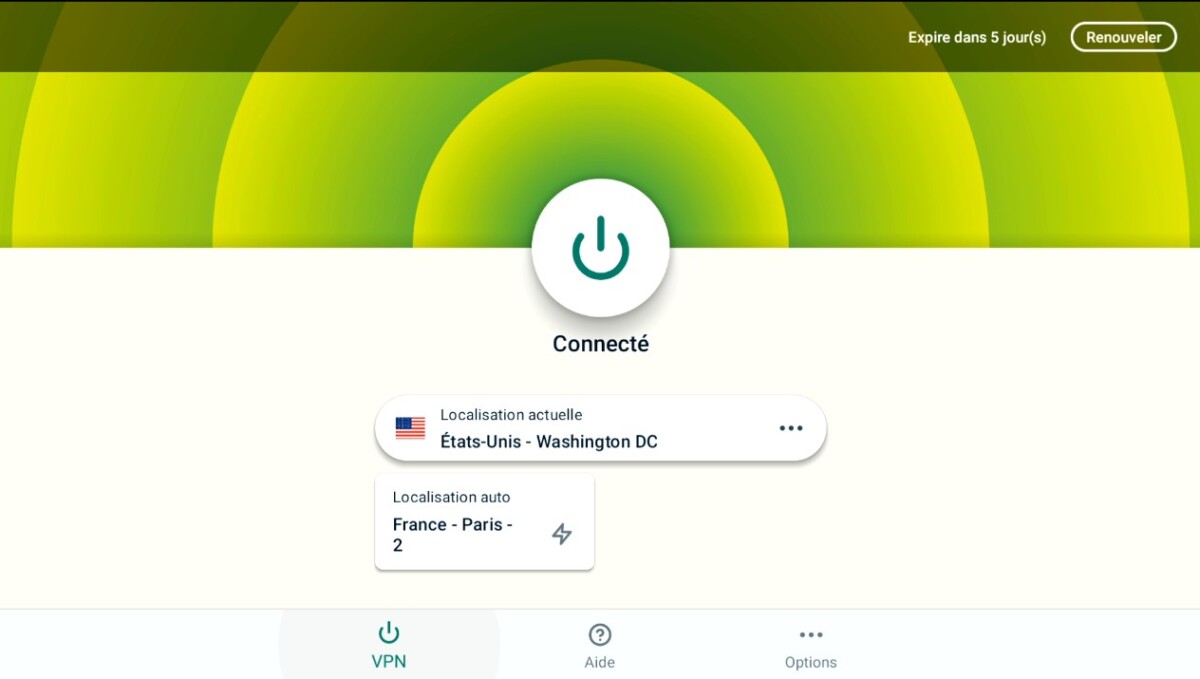
ExpressVPN’s Googe TV interface mirrors that of the mobile version, but retains the ease of use
NordVPN: The reference
You must have heard of NordVPN, whether on television or on the web. It is arguably the best-known VPN service to date, but its reputation is not overused, as it is also one of the most efficient. Its other strong point concerns its performance, excellent speeds and a very controlled ping depending on the country where you connect, even if you should not expect miracles from the other side of the world. Whatever the use, Nord VPN responds remarkably well to the effort, whether for streaming video from VOD platforms (Netflix, Prime Video, Disney+, etc.) or for downloading in P2P. It also has specific servers for this type of use, which is not the case everywhere.
It is good to know that NordVPN is one of the VPNs with a fairly extensive transparency policy, especially regarding data retention. The service has used four independent auditing companies to confirm its privacy policy: no user data is stored if shared with third parties. If you want to learn more about Nord VPN, you can check out our full review.

ProtonVPN: The Safest
ProtonVPN is a veteran in the online virtual networking world. The service has over 1,300 servers in 61 destinations and offers excellent performance regardless of country (depending on distance of course). It also offers a very effective geoblocking bypass system. All you have to do is connect to an American, Canadian or German server to access the national catalogs of Netflix, but also of other streaming video players. Beware, however, of its free version which offers limited bandwidth and a limited number of servers, the United States being absent from this list.
Regarding ProtonVPN’s data retention policy, it is very clear (albeit in English): the provider claims not to retain any information concerning the use that its users make of its VPN servers. The only data ProtonVPN collects is when a user connects to one of its servers (and only the timestamp). It is one of the most secure and transparent VPN services to date as we detail in our full review.
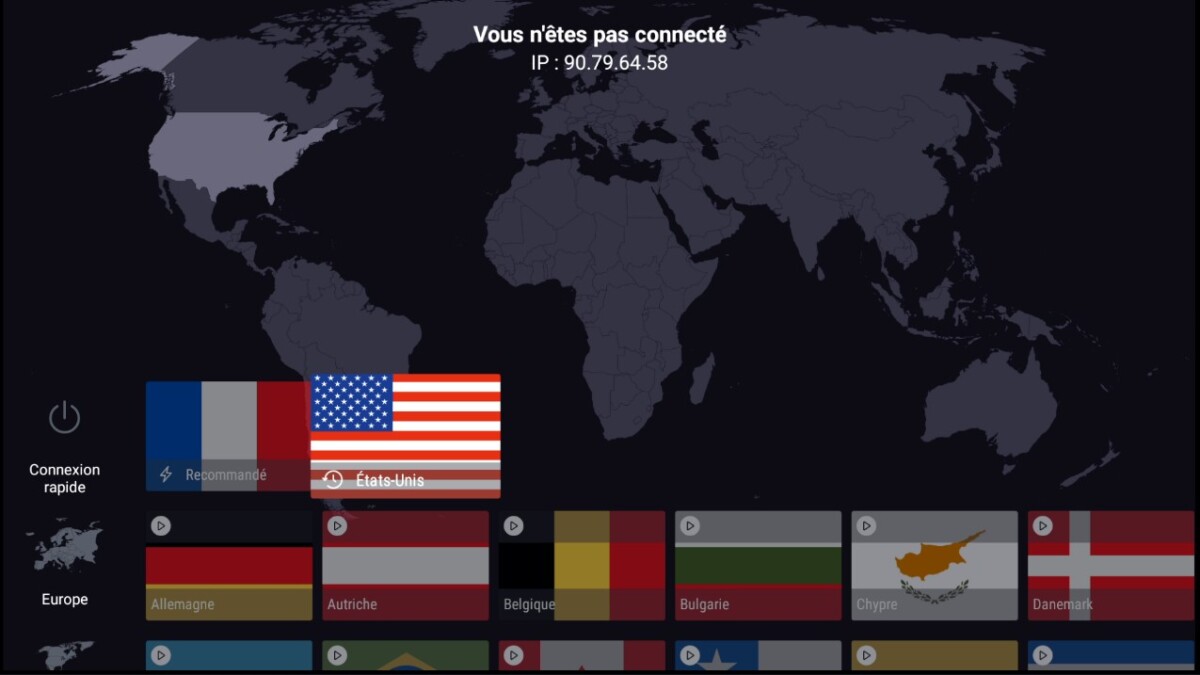

How to install a VPN on your connected TV?
Depending on your device (TV or Android box), the installation method differs. Obviously, the simplest method is to be able to install the application directly on your device when it is compatible via the Play Store. However, even if your TV is not compatible, it is still possible to use a VPN service through your router.
Smart TVs and boxes under Google TV/Android TV
While waiting for a hypothetical Google Pixel TV, Google TV (formerly Android TV) remains the most common TV OS among TV manufacturers. Here are the affected brands:
- sony
- panasonic
- Phillips
- TCL
- Toshiba
- Sharp
- Hisense
- Hitachi
- Xiaomi
And if your TV is not connected, the alternative of boxes under Google TV is a great way to overcome it. The latter use the same interface, even if they do not necessarily have the same updates according to the brands. If you are interested in a TV box, we can only advise you to turn to the Nvidia Shield TV which remains the best Google / Android TV box on the market today. You can also turn to Google’s solution, the Chromecast with Google TV, a very efficient HDMI dongle to transform any television into a connected TV.
Some operators like Bouygues Télécom or Free integrate Google TV into their TV decoders, as is the case with the Bbox 4K or the Freebox Pop. Even if the interfaces have been partially customized by the operator, the Play Store is easily accessible with all downloadable VPNs.
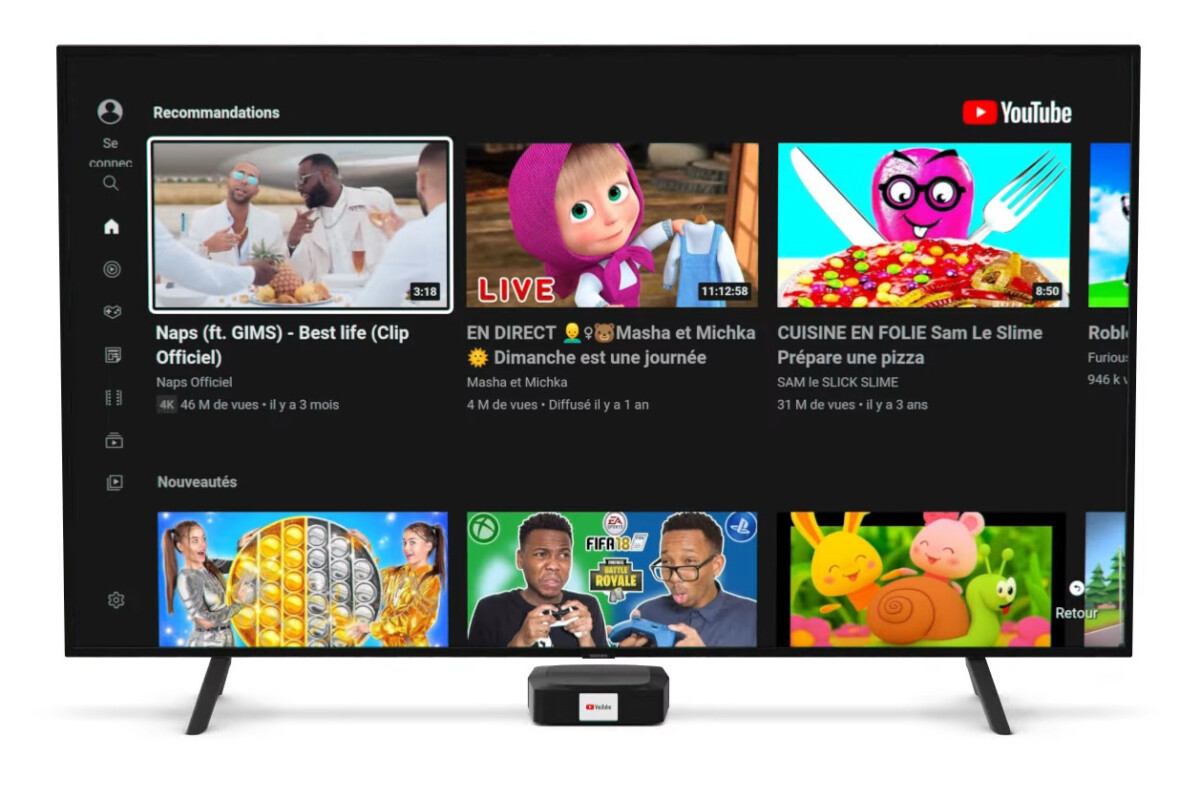
Smart TVs under another OS (WebOS, Firefox OS, etc.)
Apart from Google TV, there are of course other in-house OSes operated by other brands. We think in particular of WebOS at LG, TizenOS at Samsung, or FireOS TV. If everyone has a panel of common applications, this is not really the case for VPNs who have deliberately favored developing their applications as a priority on GoogleTV or FireOS (itself based on Android), the most widespread platforms. nowadays.
It is however possible to use a VPN on these platforms without having to go through an application, but simply through an internet box, router or modem.
Most modern routers or operator boxes (Livebox, SFR Box, Freebox or Bbox) support VPN connections. All you need to do is manually enter the details of the VPN account you are using into your router settings. So first make sure your router is compatible with a VPN. However, it is impossible to give a precise procedure for each router or Internet box on the market, as the interfaces and ways of proceeding can vary widely. Fortunately, the connection interfaces of your boxes or routers are based on the same organizational logic.
In all cases. There must be a menuvpn” Where “Private Networkin this login interface. Some Internet boxes will require specific access such as “Pro” Where “Advanced Userto access VPN options, for example the Orange Livebox.
Here is the information you will usually be asked for.
- VPN name;
- Server URL;
- email address linked to your VPN;
- Password for your VPN account;
- An encryption key.
Once all your information has been filled in, click on OK to save them and restart your router.
